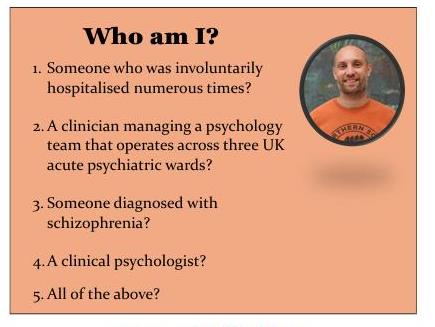Consumer Perspective
I’ll try to get to some sort of nuanced academic understanding of this term, but I’ll just start with simplicity.
A Consumer Perspective is the ‘perspective’ of, or how the social world looks to, ‘consumers’ or people using or being provided services or product (voluntarily or otherwise) by an organisation or system.
CP is not solely ‘Lived Experience’ or phenomenology. A consumer experience is a necessary part of working from a consumer perspective, but that in itself is not sufficient.
The term ‘consumer perspective’ as an academic and practical discipline refers to what is studied, from what viewpoint it is being studied and by whom it is being studied, expounded and practiced; us, our people.
Otherwise, it’s ethnography, a valid discipline but not CP.
Consumer Perspective, like psychology, social work and the rest are academic disciplines, bodies of knowledge developed over decades, from the experiences of people working in the field, here and overseas, from research and from the work of academics.
We stand on the shoulders of giants.
We don’t need to each of us learn from our own experiences, facing the same challenges and doing the same learning, dozens or hundreds of us walking the same bit of road, facing the same risks.
Someone who practices within any academic discipline, like Consumer Perspective Discipline has access to the experience of decades of other workers and to best practice and evidence.
We draw from our own experiences of living as consumers, but also from our discipline.
Consumer Perspective is what you can practically see and do from this ‘receiving a service/product’ social role/place that people in a different part of the social structure, for instance, a ‘providing service’ role simply cannot see at all, or cannot properly interpret from their viewing position.
And of course, Consumer Perspective is also about what you can’t see and do, from the ‘consumer’ perch that others in our community can from other positions.
In practice Consumer Perspective can have as many uses and applications as any other of the formal and studied means of seeing and explaining our social reality.
A few follow.
A Rights/Equity focus. This focuses on what a person in a ‘receiving service’ role can’t see and do, what commonly assumed protections and rights are just not visible or accessible in theory or practice from the ‘consumer’ perch.
There are formal and informal lists of expectations our society recognises for what’s ‘a fair go’ which most people take for granted; broad guarantees of bodily autonomy, similar for freedom of movement, no incarceration without a formal judicial process and others.
It’s distressing to see the common shock and disbelief when people reach out for these assumed protections and they are gone, because they are now in the ‘consumer’ position, because most people have no idea this is possible.
So here charting and documenting the Consumer Perspective can identify and document these ‘vanished rights’ and also educate and lobby those in power, including voters, for remedies on the basis of equity.
Communication/Peer support focus. To communicate meaningfully at all, certain shared language, experiences and expectations are needed.
Establishing and publishing the Consumer Perspective discipline identifies our social experience as different enough to affect communication and to be identified as a coherent and valid worldview, our own ‘language’ or at least dialect. This allows two further CP specialities.
Advocacy. I don’t know how many times I’ve seen consumers explain concerns quite clearly to be denied redress, when I, as a Consumer Perspective Advocate, repeat exactly the same concerns in slightly different terms to get a response of ‘Of course we can do that. Why didn’t they ask for that in the first place?’ They did, but not in the one precise and privileged form that the examiner demands.
Peer Support. A common characteristic of being identified/self-identifying as neurodiverse/mentally ill/distressed is loneliness, isolation. Sometimes experiences unique among our acquaintances contribute, often just the label and its service implications separates you from who and what you have been.
You can feel unique, damaged, and different.
A practical formulation of some Consumer Perspective principles and observed behaviours, such as Intentional Peer Support can allow not only vitally important two-way communication, a relief to some issues of isolation, but ways to demonstrate that though our paths are all individual, the road has been travelled countless times by others, and worthwhile destinations reached.
A Quality Improvement/Consumer Consultancy Focus. Consumers of specific services ‘see’ organisations from the ‘ground up.’ They have valuable information about the service.Power differentials, different world views and ‘busy-ness’ can discourage the service receiving this knowledge.
When consumers are consulted by Consumer Perspective workers, these barriers are reduced, and asking users of the service what they see, can reveal problems or places for improvement that the most interested staff just can’t see from their perch on top. (How many tv shows have we seen about medicos who become patients and experience epiphanies?)
Identifying the areas where a system is inefficient or harmful helps the organisation, but more importantly, protects and assists people receiving services.
Training of Staff/Recovery theory focus. In staff training, if a trainer authentically has this ‘Consumer Perspective’ then it has been possible to share certain factual practical information from that perspective that might help staff do a better job for their clients.
I, as a male, will never be able to fully understand the perspective of a woman. That doesn’t excuse me from listening when that perspective is offered authentically and making whatever practical changes in my work or interaction this new, however limited, understanding requires.
The same can be true of mental health service provision.
So that’s part of my conception of Consumer Perspective. I could go on, to Consumer Perspective Reflective Practice with my professional peers, CP Academics/Theory-making/research and transformative frameworks such as Mad Ethnicity, interaction of Consumer Perspective with other social roles and theory explaining them, Consumer Perspective derived ethics and values, Consumer Perspective informed political action, Consumer Perspective history, both of the movement and of the world, even Consumer Perspective stand-up comedy..
All the above and much more, just from asking, ‘How’s the view from where you are, comrade?’

